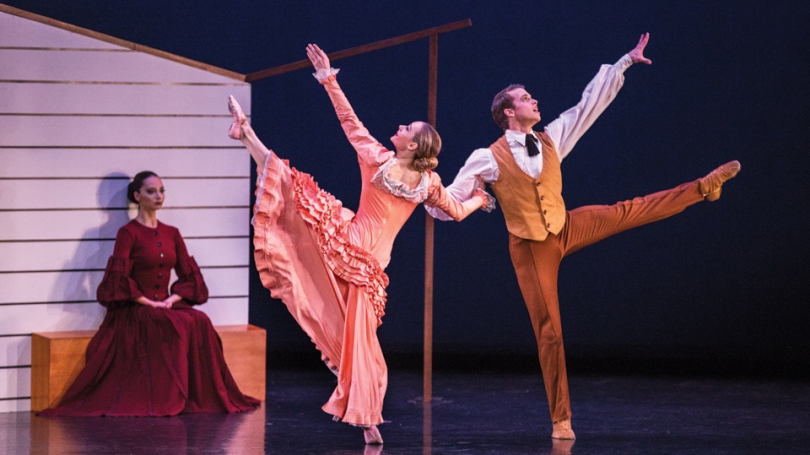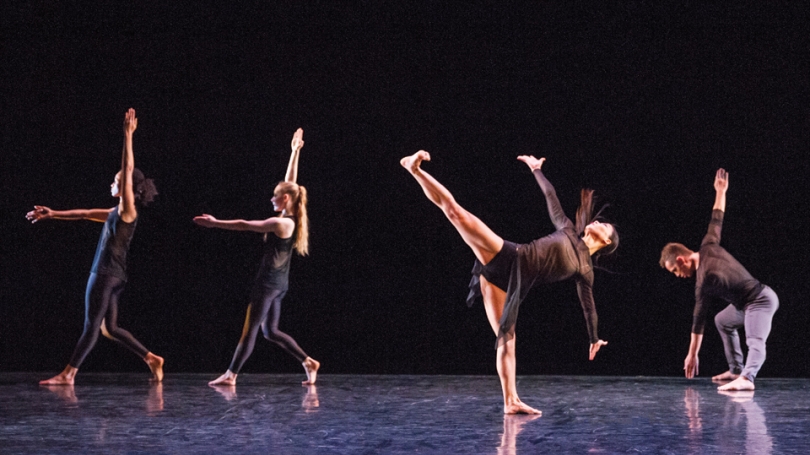A Celebration of Female Dance Innovators, Past and Present
Dec. 12, 2019: A look ahead to a January 2020 Hopkins Center residency and performance by the legendary Martha Graham Dance Company.
HANOVER, NH--Female dance leaders collaborate across generations in a program by the Martha Graham Dance Company at the Hopkins Center for the Arts at Dartmouth on January 17 and 18.
The company's residency at the Hop also offers the region's dancers and dance lovers special learning and networking opportunities:
- A dance master class with company dancers, on Wednesday, January 15;
- Pre-show talks on Friday and Saturday, January 17 and 18, focusing on Graham's legacy and women in dance today, including in this region;
- "Meet and Move," a workshop and reception for dancemakers from this region.
Founded 93 years ago by one of the greatest arts pioneers of the 20th-century, MGDC continues that tradition of female creators with its EVE project, commissioning work by today's distinctive women choreographers in honor of the 2020 centennial of the 19th Amendment.
At the Hop, MGDC will perform Untitled (Souvenir), an EVE commission by Pam Tanowitz, who lit up the Hop last season with her New Goldberg Variations, performed with pianist Simone Dinnerstein. Untitled (Souvenir) is performed to a score by Pulitzer-winning composer Caroline Shaw, who performed at the Hop in YEAR as part of the vocal ensemble Roomful of Teeth.
Encouraged by MGDC Artistic Director Janet Eilber, Tanowitz built her work from appealing shapes and phrases from Graham's work. The result is a stripped-down, eloquent work for eight dancers that spools, at slow-to-medium pace, to Shaw's brightly colored score for double string quartet.
The Hop program also includes MGDC's 2007 Lamentation Variations, in which contemporary dancemakers riff on Graham's 1930 solo Lamentation. The company will close with Graham's iconic Appalachian Spring. Music for the performance will be played by an ensemble including members of the Dartmouth Symphony Orchestra, conducted by Filippo Ciabatti.
MORE ABOUT...
Recognized as one of the greatest artists of the 20th century, Martha Graham (1894 to 1991) has had a staggering influence on dance that has often been compared to Picasso's on painting, Stravinsky's on music and Frank Lloyd Wright's on architecture. She created 181 ballets and a dance technique that has been compared to ballet in its scope and magnitude and is still taught worldwide.
Raised in well off but by no means arts-oriented family, Graham saw her first dance performance at age 17 in 1911, watching Ruth St. Denis perform in Los Angeles. Within a few years, she was studying dance and performing with St. Denis and St. Denis's husband Ted Shawn, until 1923. In 1926, she founded her own dance company and school, living and working out of a tiny Carnegie Hall studio in midtown Manhattan. In developing her technique, Graham experimented endlessly with basic human movement, beginning with the most elemental movements of contraction and release. Using these principles as the foundation for her technique, she built a vocabulary of movement that has been and continues to be a source of inspiration for generations of dance and theater artists.
Graham's ballets were inspired by a wide variety of sources, including modern painting, the American frontier, religious ceremonies of Native Americans, and Greek mythology. Many of her most important roles portray great women of history and mythology: Clytemnestra, Jocasta, Medea, Phaedra, Joan of Arc, and Emily Dickinson.
As an artist, Graham conceived each new work in its entirety – dance, costumes, and music. During her 70 years of creating dances, she collaborated with such artists as sculptor Isamu Noguchi; actor and director John Houseman; fashion designers Halston, Donna Karan and Calvin Klein; and renowned composers including Aaron Copland, Louis Horst (her mentor), Samuel Barber, William Schuman, Carlos Surinach, Norman Dello Joio, and Gian Carlo Menotti. Her company was the training ground for many future modern choreographers, including Merce Cunningham, Paul Taylor, and Twyla Tharp. She created roles for classical ballet stars such as Margot Fonteyn, Rudolf Nureyev, and Mikhail Baryshnikov, welcoming them as guests into her company.
Pam Tanowitz is a celebrated New York-based choreographer and collaborator known for her unflinchingly post-modern treatment of classical dance vocabulary. In 2000, she founded Pam Tanowitz Dance to explore dance-making with a consistent community of dancers.
In January 2019, Tanowitz was named the first-ever choreographer in residence at the Richard B. Fisher Center for the Performing Arts at Bard College in Annandale-on-Hudson, New York.
In May 2019, Tanowitz received an Herb Alpert Award in the Arts. In 2016, Tanowitz was presented with the Juried Bessie Award for "using form and structure as a vehicle for challenging audiences to think, to feel, to experience movement; for pursuing her uniquely poetic and theatrical vision with astounding rigor and focus." Other honors include an Outstanding Production Bessie award in 2009 for her dance Be In the Gray With Me, a Foundation for Contemporary Arts award in 2010, Guggenheim Fellowship in 2011, the Hodder Fellowship from Princeton University in 2013-14, a Fall 2016 fellowship at the Center for Ballet and the Arts at NYU, and named a 2016-2017 City Center Choreography Fellow. Her work was selected by the New York Times Best of Dance series in 2013, 2014, 2015, 2017, and 2018.
Tanowitz's 2017 dance New Work for Goldberg Variations, created for her company in collaboration with pianist Simone Dinnerstein, was called a "rare achievement" (New York Times). Her most recent work, the 2018 creation Four Quartets, inspired by T.S. Eliot's literary masterpiece and set to music by Kaija Saariaho, was called "the greatest creation of dance theater so far this century" (New York Times).
She has been commissioned by The Joyce Theater, The John F. Kennedy Center for the Performing Arts, Bard Summerscape Festival, Vail International Dance Festival, New York Live Arts, The Guggenheim Museum's Works & Process series, Danspace Project, Lincoln Center Out of Doors, Chicago Dancing Festival, Baryshnikov Arts Center, Jacob's Pillow Dance Festival, Duke Performances, Peak Performances, FSU's Opening Nights Series, and the Institute for Contemporary Art/Boston.
Tanowitz has created or set work for the Martha Graham Dance Company, Paul Taylor American Modern Dance, New York City Ballet, City Center's Fall for Dance Festival, The Juilliard School, Ballet Austin, New York Theater Ballet and Saint Louis Ballet; and has been a guest choreographer at Barnard College, Princeton University, Mason Gross School of the Arts at Rutgers University, Marymount Manhattan College and Purchase College.
Caroline Shaw is a New York-based musician—vocalist, violinist, composer, and producer—who performs in solo and collaborative projects. She was the youngest recipient of the Pulitzer Prize for Music in 2013 for Partita for 8 Voices, written for the Grammy-winning Roomful of Teeth, of which she is a member. Recent commissions include new works for Renée Fleming with Inon Barnatan, Dawn Upshaw with Sō Percussion and Gil Kalish, the Orchestra of St. Luke's with John Lithgow, the Dover Quartet, TENET, The Crossing, the Mendelssohn Club of Philadelphia, the Calidore Quartet, Brooklyn Rider, the Baltimore Symphony, Roomful of Teeth with A Far Cry, Anne Sofie von Otter with Philharmonia Baroque, the LA Philharmonic, and Juilliard 415. Her film scores include Erica Fae's To Keep the Light and Josephine Decker's Madeline's Madeline as well as the upcoming short 8th Year of the Emergency by Maureen Towey. She has produced for Kanye West (The Life of Pablo; Ye) and Nas (NASIR), and has contributed to records by The National, and by Arcade Fire's Richard Reed Parry.

